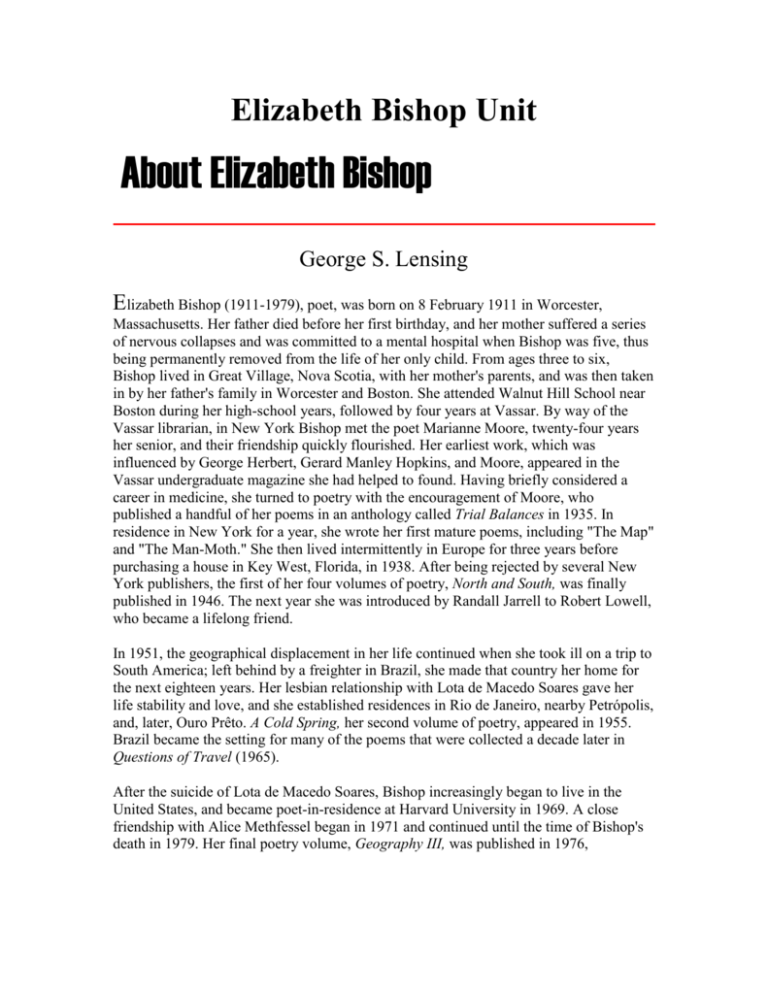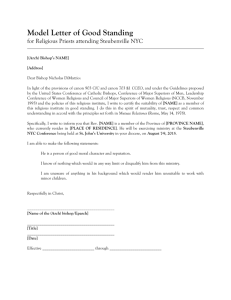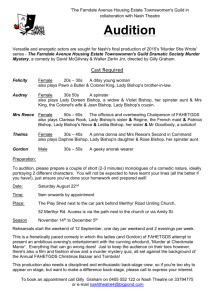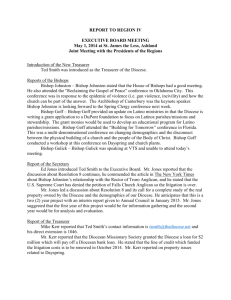
Elizabeth Bishop Unit
About Elizabeth Bishop
George S. Lensing
Elizabeth Bishop (1911-1979), poet, was born on 8 February 1911 in Worcester,
Massachusetts. Her father died before her first birthday, and her mother suffered a series
of nervous collapses and was committed to a mental hospital when Bishop was five, thus
being permanently removed from the life of her only child. From ages three to six,
Bishop lived in Great Village, Nova Scotia, with her mother's parents, and was then taken
in by her father's family in Worcester and Boston. She attended Walnut Hill School near
Boston during her high-school years, followed by four years at Vassar. By way of the
Vassar librarian, in New York Bishop met the poet Marianne Moore, twenty-four years
her senior, and their friendship quickly flourished. Her earliest work, which was
influenced by George Herbert, Gerard Manley Hopkins, and Moore, appeared in the
Vassar undergraduate magazine she had helped to found. Having briefly considered a
career in medicine, she turned to poetry with the encouragement of Moore, who
published a handful of her poems in an anthology called Trial Balances in 1935. In
residence in New York for a year, she wrote her first mature poems, including "The Map"
and "The Man-Moth." She then lived intermittently in Europe for three years before
purchasing a house in Key West, Florida, in 1938. After being rejected by several New
York publishers, the first of her four volumes of poetry, North and South, was finally
published in 1946. The next year she was introduced by Randall Jarrell to Robert Lowell,
who became a lifelong friend.
In 1951, the geographical displacement in her life continued when she took ill on a trip to
South America; left behind by a freighter in Brazil, she made that country her home for
the next eighteen years. Her lesbian relationship with Lota de Macedo Soares gave her
life stability and love, and she established residences in Rio de Janeiro, nearby Petrópolis,
and, later, Ouro Prêto. A Cold Spring, her second volume of poetry, appeared in 1955.
Brazil became the setting for many of the poems that were collected a decade later in
Questions of Travel (1965).
After the suicide of Lota de Macedo Soares, Bishop increasingly began to live in the
United States, and became poet-in-residence at Harvard University in 1969. A close
friendship with Alice Methfessel began in 1971 and continued until the time of Bishop's
death in 1979. Her final poetry volume, Geography III, was published in 1976,
Bishop often spent many years writing a single poem, working toward an effect of
offfhandedness and spontaneity. Committed to a "passion for accuracy," she re-created
her worlds of Canada, America, Europe, and Brazil. Shunning self-pity, the poems thinly
conceal her estrangements as a woman, a lesbian, an orphan, a geographically rootless
traveler, a frequently hospitalized asthmatic, and a sufferer of depression and alcoholism.
"I'm not interested in big-scale work as such," she once told Lowell. "Something needn't
be large to be good."
Manuscript holdings are at the Houghton Library, Harvard University; the Rosenbach
Museum and Library, Philadelphia, Pennsylvania; the Vassar College Library; and the
Washington University Libraries.
From The Oxford Companion to Women’s Writing in the United States. Copyright ©
1995 by Oxford University Press.
Anne Agnes Colwell
Bishop, Elizabeth (8 Feb. 1911-6 Oct. 1979), poet, was born in Worcester,
Massachusetts, the daughter of Gertrude Bulmer and William Thomas Bishop, owners of
the J. W. Bishop contracting firm. Bishop's childhood was filled with a sense of loss that
pervades her poetry. Her father died from Bright's disease when she was eight months
old. Her mother, psychologically distraught, spent the next five years in and out of
psychiatric hospitals. With William's death, Gertrude lost her U.S. citizenship and, when
she experienced the decisive breakdown in her family home in Nova Scotia, was
hospitalized in a public sanatorium in Dartmouth, Nova Scotia. Elizabeth Bishop was five
when this breakdown occurred; she later recounted it in her prose masterpiece "In the
Village." Her mother, diagnosed as permanently insane, never saw Elizabeth again.
After her mother's hospitalization, Bishop lived in Great Village, Nova Scotia, with her
mother's family, in a loving, comforting atmosphere. However, the equilibrium that she
had gained was upset by her paternal grandparents' decision to raise the child with them
in Worcester. In her prose memoir "The Country Mouse," Bishop writes,"I had been
brought back unconsulted and against my wishes to the house my father had been born in,
to be saved from a life of poverty and provincialism." There, in isolated wealth, Bishop
keenly felt her lack of relations. She wrote, "I felt myself aging, even dying. I was bored
and lonely with Grandma, my silent grandpa, the dinners alone. . . . At night I lay
blinking my flashlight off and on, and crying."
When her mother's sister, Maud Bulmer Shepherdson, rescued Bishop in May 1918, even
her paternal grandparents saw that their "experiment" had failed. Never a strong child,
Bishop now suffered from eczema, asthma, St. Vitus's dance, and nervous ailments that
made her nearly too weak to walk. Maud Shepherdson lived in an apartment in a South
Boston tenement. An unpublished manuscript, "Mrs. Sullivan Downstairs," recounts
Bishop's love for this neighborhood. There, Bishop later recalled, she began to write
poetry, influenced by Aunt Maud's love of literature.
As she grew stronger, Bishop spent her summers in Nova Scotia and attended Camp
Chequesset on Cape Cod. Her unusual circumstances and poor health limited her formal
schooling before age fourteen. However, she was an excellent student, and following her
time at the Walnut Hill School for Girls, Bishop entered the Vassar College class of
1934.
At Vassar, Bishop, with novelist Mary McCarthy and others, began an underground
literary magazine, Con Spirito, publishing a more socially conscious and avant-garde
selection than the legitimate Vassar Review. In the spring of 1934, the year her mother
died and the year of her graduation, Bishop met and became friends with poet Marianne
Moore. Through Moore's influence, Bishop came to see poetry as an available, viable
vocation for a woman. Moore recommended Bishop for the Houghton Mifflin Prize, and
Bishop's manuscript North and South was chosen for publication in August 1946 from
over 800 entries.
North and South introduces the themes central to Bishop's poetry: geography and
landscape, human connection with the natural world, questions of knowledge and
perception, and the ability or inability of form to control chaos. Before Robert Lowell
reviewed North and South, he met Bishop at a dinner party, a meeting that marked the
beginning of a crucial, if complicated, friendship. Lowell, like Moore, showed Bishop
possibilities--practically, in the form of grants, fellowships, and awards, and artistically.
In 1950 Lowell helped Bishop secure the post of poetry consultant for the Library of
Congress while she worked on her second book.
Bishop won the Lucy Martin Donnelly Fellowship from Bryn Mawr College in 1950 and
an award from the American Academy of Arts and Letters. In 1951 she traveled to South
America to see the Amazon. However, before she could leave for the dreamed-of voyage,
Bishop ate a cashew fruit to which she had a violent allergic reaction that kept her
bedridden. As Bishop recovered her health, she fell in love, both with Lota de Macedo
Soares, her friend and nurse, and with the landscape and culture of Brazil. For fifteen
years Bishop lived with Soares, in the mountain town of Petropolis and in Rio de Janeiro.
This new love and home offered Bishop happiness she had known only briefly in Great
Village. She wrote to Lowell that she was "extremely happy for the first time in my life"
(28 July 1953).
In April 1954 Bishop made an agreement with Houghton Mifflin to publish her second
book, A Cold Spring, in a volume that included the poems from her first book, under the
title Poems: North and South--A Cold Spring. This book won the 1956 Pulitzer Prize.
When the book appeared in August 1955, the reviews were laudatory: Donald Hall called
Bishop "one of the best poets alive."
After publishing A Cold Spring, Bishop spent the next three years translating a popular
Brazilian work, the diary of "Helena Morely" (Dona Alice Brant) called Minha Vida de
Menina. The story of Helena's life in the small town of Diamantina in 1893 reminded
Bishop of her 1916 Great Village, and translating this work while reflecting on and
writing about her own childhood helped Bishop explore her past as artistic material. The
translation was published under the title The Diary of Helena Morely by Farrar, Straus,
and Cudahy in 1957.
Bishop's third book, Questions of Travel (1965), includes both reflections on her
childhood experiences and poems about her new home in Brazil. The book is divided into
two sections, Brazil and Elsewhere, with the prose piece "In the Village" placed between
the divisions. Bishop returns to themes of geography, form, and landscape, but here she
allows more intimacy, both between viewer and landscape and between reader and poet.
Questions of Travel garnered positive reviews. Robert Mazzocco in the New York Review
of Books (Oct. 1967) called Bishop "one of the shining, central talents of our day." The
book is filled with the description for which Bishop received so much praise, but it is also
filled with an unmistakable sense of what Wyatt Prunty calls "the askew," moments in
which the senses fail to report reality, slide off into the mysterious, terrifying, or ecstatic.
Throughout the mid-1960s, life in Brazil grew difficult for Bishop. Lota de Macedo
Soares, involved in the politics of Rio, had taken charge of a public parks project that
absorbed her time and attention. As the political situation worsened, Bishop felt more
uncomfortable in her Brazilian home. In 1966 Bishop spent two semesters as poet in
residence at the University of Washington but returned to Rio in the hope of
reestablishing her life there. Both Bishop and Soares suffered physical and psychological
distress and were hospitalized in Brazil. When Bishop grew stronger, she left for New
York with the expectation that Soares, as soon as she was well enough, would join her.
Soares arrived in New York on the afternoon of 19 September 1967 and later that
evening took an overdose of tranquilizers and died at age fifty-seven.
This loss proved terribly difficult for Bishop personally, although she continued to write
and publish. In 1969 Bishop published Complete Poems, a volume that included all of her
previously published poems and several new pieces. This book won the National Book
Award for 1970. When the ceremony took place, Bishop was once again trying to
reestablish a Brazilian life. However, the politics, along with Bishop's inability to
negotiate the culture without Soares's help, finally convinced her that a Brazilian life was
impossible. In the fall of 1970 she returned to the United States to teach at Harvard.
There Bishop met the woman who became a source of strength and love for the rest of
her life, Alice Methfessel.
Bishop eventually signed a four-year contract with Harvard. Although she never felt
completely comfortable as a teacher, her students report learning much from her
precision, from the quiet conversation that constituted her class. In 1976 Bishop became
the first American and the first woman to be awarded the Books Abroad/Neustadt
International Prize for Literature. In that year she also published her last collection of
poetry, Geography III, which won the Book Critics' Circle Award for 1977. This volume
of nine beautifully crafted poems returns to themes of North and South but with greater
intimacy and immediacy. Alfred Corn, writing in the 1977 Georgia Review, gives a clear
and insightful reading of Geography III that could apply to all Bishop's work. He praises
a perfected transparence of expression, warmth of tone, and a singular blend of sadness
and good humor, of pain and acceptance--a radiant patience few people ever achieve and
few writers ever successfully render. The poems are works of philosophic beauty and
calm, illuminated by that "laughter in the soul" that belongs to the best part of the comic
genius.
When Bishop submitted her application for a Guggenheim Fellowship on 1 October
1977, she indicated that she would work on a new volume, tentatively titled
"Grandmother's Glass Eye," and a book-length poem, Elegy. Four poems of the new
volume, "Santarem," "North Haven," "Pink Dog," and "Sonnet," were complete when
Bishop died in Boston, Massachusetts. Bishop's poems have been collected in The
Complete Poems, 1927-1979, published by Farrar, Straus and Giroux (1983).
Bibliography
Elizabeth Bishop's papers are in both the Houghton Library, Harvard University, and
Vassar College Library special collections. Brett C. Millier's biography Elizabeth Bishop:
Life and the Memory of It (1993) is a valuable resource, as is Candace W. MacMahon's
bibliography Elizabeth Bishop: A Bibliography, 1927-1979 (1980). Other important
critical assessments of Bishop's work include Bonnie Costello, Elizabeth Bishop:
Questions of Mastery (1991); David Kalstone, Becoming a Poet (1989); Jeredith Merrin,
An Enabling Humility: Marianne Moore, Elizabeth Bishop, and the Uses of Tradition
(1990); Robert Dale Parker, The Unbeliever: The Poetry of Elizabeth Bishop (1988); and
Thomas Travisano, Elizabeth Bishop: Her Artistic Development (1988). Her prose is in
The Collected Prose (1984), with a helpful introduction by Robert Giroux. Giroux also
edited and published Bishop's letters, masterpieces in themselves, in One Art: Letters
(1994). An obituary is in the New York Times (8 Oct. 1979.
Source: http://www.anb.org/articles/16/16-01885.html; American National Biography
Online Feb. 2000. Access Date: Sun Mar 18 16:53:45 2001 Copyright (c) 2000 American
Council of Learned Societies. Published by Oxford University Press. All rights reserved.
From The Modern American Poetry Homepage
http://www.english.illinois.edu/maps/index.htm
Questions of Travel
“As you set out for Ithaka
hope your road is a long one,
full of adventure, full of discovery.”
-Cafavy
“I have discovered that all human
evil comes from this, man’s being
unable to sit still in a room”
Blaise Pascal
“Travelling is a fool’s paradise. Our first journeys discover to us
the indifference of places. At home I dream that at Naples, at Rome,
I can be intoxicated with beauty and lose my sadness. I pack my trunk,
embrace my friends, embark on the sea, and at last wake up in
Naples, and there beside me is the stern fact, the sad self, unrelenting,
Identical, that I fled from. I seek the Vatican and the palaces. I affect
to be intoxicated with sights and suggestions, but I am not intoxicated.
My giant goes with me wherever I go.”
Ralph Waldo Emerson
“And this gray spirit yearning in desire
To follow knowledge like a sinking star,
Beyond the utmost bound of human thought.”
Alfred Lord Tennyson
Questions of Travel
There are too many waterfalls here; the crowded streams
hurry too rapidly down to the sea,
and the pressure of so many clouds on the mountaintops
makes them spill over the sides in soft slow-motion,
turning to waterfalls under our very eyes.
--For if those streaks, those mile-long, shiny, tearstains,
aren't waterfalls yet,
in a quick age or so, as ages go here,
they probably will be.
But if the streams and clouds keep travelling, travelling,
the mountains look like the hulls of capsized ships,
slime-hung and barnacled.
Think of the long trip home.
Should we have stayed at home and thought of here?
Where should we be today?
Is it right to be watching strangers in a play
in this strangest of theatres?
What childishness is it that while there's a breath of life
in our bodies, we are determined to rush
to see the sun the other way around?
The tiniest green hummingbird in the world?
To stare at some inexplicable old stonework,
inexplicable and impenetrable,
at any view,
instantly seen and always, always delightful?
Oh, must we dream our dreams
and have them, too?
And have we room
for one more folded sunset, still quite warm?
But surely it would have been a pity
not to have seen the trees along this road,
really exaggerated in their beauty,
not to have seen them gesturing
like noble pantomimists, robed in pink.
--Not to have had to stop for gas and heard
the sad, two-noted, wooden tune
of disparate wooden clogs
carelessly clacking over
a grease-stained filling-station floor.
(In another country the clogs would all be tested.
Each pair there would have identical pitch.)
--A pity not to have heard
the other, less primitive music of the fat brown bird
who sings above the broken gasoline pump
in a bamboo church of Jesuit baroque:
three towers, five silver crosses.
--Yes, a pity not to have pondered,
blurr'dly and inconclusively,
on what connection can exist for centuries
between the crudest wooden footwear
and, careful and finicky,
the whittled fantasies of wooden cages.
--Never to have studied history in
the weak calligraphy of songbirds' cages.
--And never to have had to listen to rain
so much like politicians' speeches:
two hours of unrelenting oratory
and then a sudden golden silence
in which the traveller takes a notebook, writes:
"Is it lack of imagination that makes us come
to imagined places, not just stay at home?
Or could Pascal have been not entirely right
about just sitting quietly in one's room?
Continent, city, country, society:
the choice is never wide and never free.
And here, or there . . . No. Should we have stayed at home,
wherever that may be?"
Filling Station
Oh, but it is dirty!
—this little filling station,
oil-soaked, oil-permeated
to a disturbing, over-all
black translucency.
Be careful with that match!
Father wears a dirty,
oil-soaked monkey suit
that cuts him under the arms,
and several quick and saucy
and greasy sons assist him
(it’s a family filling station),
all quite thoroughly dirty.
Do they live in the station?
It has a cement porch
behind the pumps, and on it
a set of crushed and greaseimpregnated wickerwork;
on the wicker sofa
a dirty dog, quite comfy.
Some comic books provide
the only note of color—
of certain color. They lie
upon a big dim doily
draping a taboret
(part of the set), beside
a big hirsute begonia.
Why the extraneous plant?
Why the taboret?
Why, oh why, the doily?
(Embroidered in daisy stitch
with marguerites, I think,
and heavy with gray crochet.)
Somebody embroidered the doily.
Somebody waters the plant,
or oils it, maybe. Somebody
arranges the rows of cans
so that they softly say:
ESSO—SO—SO—SO
to high-strung automobiles.
Somebody loves us all.
One Art
The art of losing isn't hard to master;
so many things seem filled with the intent
to be lost that their loss is no disaster,
Lose something every day. Accept the fluster
of lost door keys, the hour badly spent.
The art of losing isn't hard to master.
Then practice losing farther, losing faster:
places, and names, and where it was you meant
to travel. None of these will bring disaster.
I lost my mother's watch. And look! my last, or
next-to-last, of three loved houses went.
The art of losing isn't hard to master.
I lost two cities, lovely ones. And, vaster,
some realms I owned, two rivers, a continent.
I miss them, but it wasn't a disaster.
- Even losing you (the joking voice, a gesture
I love) I shan't have lied. It's evident
the art of losing's not too hard to master
though it may look like (Write it!) like a disaster.
Sestina
September rain falls on the house.
In the failing light, the old grandmother
sits in the kitchen with the child
beside the Little Marvel Stove,
reading the jokes from the almanac,
laughing and talking to hide her tears.
She thinks that her equinoctial tears
and the rain that beats on the roof of the house
were both foretold by the almanac,
but only known to a grandmother.
The iron kettle sings on the stove.
She cuts some bread and says to the child,
It's time for tea now; but the child
is watching the teakettle's small hard tears
dance like mad on the hot black stove,
the way the rain must dance on the house.
Tidying up, the old grandmother
hangs up the clever almanac
on its string. Birdlike, the almanac
hovers half open above the child,
hovers above the old grandmother
and her teacup full of dark brown tears.
She shivers and says she thinks the house
feels chilly, and puts more wood in the stove.
It was to be, says the Marvel Stove.
I know what I know, says the almanac.
With crayons the child draws a rigid house
and a winding pathway. Then the child
puts in a man with buttons like tears
and shows it proudly to the grandmother.
But secretly, while the grandmother
busies herself about the stove,
the little moons fall down like tears
from between the pages of the almanac
into the flower bed the child
has carefully placed in the front of the house.
Time to plant tears, says the almanac.
The grandmother sings to the marvelous stove
and the child draws another inscrutable house.
The Moose
For Grace Bulmer Bowers
From narrow provinces
of fish and bread and tea,
home of the long tides
where the bay leaves the sea
twice a day and takes
the herrings long rides,
where if the river
enters or retreats
in a wall of brown foam
depends on if it meets
the bay coming in,
the bay not at home;
where, silted red,
sometimes the sun sets
facing a red sea,
and others, veins the flats’
lavender, rich mud
in burning rivulets;
on red, gravelly roads,
down rows of sugar maples,
past clapboard farmhouses
and neat, clapboard churches,
bleached, ridged as clamshells,
past twin silver birches,
through late afternoon
a bus journeys west,
the windshield flashing pink,
pink glancing off of metal,
brushing the dented flank
of blue, beat-up enamel;
down hollows, up rises,
and waits, patient, while
a lone traveller gives
kisses and embraces
to seven relatives
and a collie supervises.
Goodbye to the elms,
to the farm, to the dog.
The bus starts. The light
grows richer; the fog,
shifting, salty, thin,
comes closing in.
Its cold, round crystals
form and slide and settle
in the white hens’ feathers,
in gray glazed cabbages,
on the cabbage roses
and lupins like apostles;
the sweet peas cling
to their wet white string
on the whitewashed fences;
bumblebees creep
inside the foxgloves,
and evening commences.
One stop at Bass River.
Then the Economies—
Lower, Middle, Upper;
Five Islands, Five Houses,
where a woman shakes a tablecloth
out after supper.
A pale flickering. Gone.
The Tantramar marshes
and the smell of salt hay.
An iron bridge trembles
and a loose plank rattles
but doesn’t give way.
On the left, a red light
swims through the dark:
a ship’s port lantern.
Two rubber boots show,
illuminated, solemn.
A dog gives one bark.
A woman climbs in
with two market bags,
brisk, freckled, elderly.
“A grand night. Yes, sir,
all the way to Boston.”
She regards us amicably.
Moonlight as we enter
the New Brunswick woods,
hairy, scratchy, splintery;
moonlight and mist
caught in them like lamb’s wool
on bushes in a pasture.
The passengers lie back.
Snores. Some long sighs.
A dreamy divagation
begins in the night,
a gentle, auditory,
slow hallucination....
In the creakings and noises,
an old conversation
—not concerning us,
but recognizable, somewhere,
back in the bus:
Grandparents’ voices
uninterruptedly
talking, in Eternity:
names being mentioned,
things cleared up finally;
what he said, what she said,
who got pensioned;
deaths, deaths and sicknesses;
the year he remarried;
the year (something) happened.
She died in childbirth.
That was the son lost
when the schooner foundered.
He took to drink. Yes.
She went to the bad.
When Amos began to pray
even in the store and
finally the family had
to put him away.
“Yes ...” that peculiar
affirmative. “Yes ...”
A sharp, indrawn breath,
half groan, half acceptance,
that means “Life’s like that.
We know it (also death).”
Talking the way they talked
in the old featherbed,
peacefully, on and on,
dim lamplight in the hall,
down in the kitchen, the dog
tucked in her shawl.
Now, it’s all right now
even to fall asleep
just as on all those nights.
—Suddenly the bus driver
stops with a jolt,
turns off his lights.
A moose has come out of
the impenetrable wood
and stands there, looms, rather,
in the middle of the road.
It approaches; it sniffs at
the bus’s hot hood.
Towering, antlerless,
high as a church,
homely as a house
(or, safe as houses).
A man’s voice assures us
“Perfectly harmless....”
Some of the passengers
exclaim in whispers,
childishly, softly,
“Sure are big creatures.”
“It’s awful plain.”
“Look! It’s a she!”
Taking her time,
she looks the bus over,
grand, otherworldly.
Why, why do we feel
(we all feel) this sweet
sensation of joy?
“Curious creatures,”
says our quiet driver,
rolling his r’s.
“Look at that, would you.”
Then he shifts gears.
For a moment longer,
by craning backward,
the moose can be seen
on the moonlit macadam;
then there’s a dim
smell of moose, an acrid
smell of gasoline.








